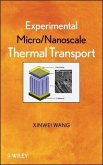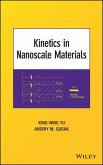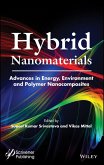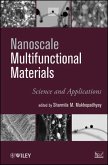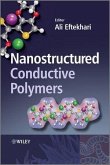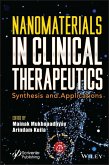107,99 €
107,99 €
inkl. MwSt.
Sofort per Download lieferbar

0 °P sammeln
107,99 €
Als Download kaufen

107,99 €
inkl. MwSt.
Sofort per Download lieferbar

0 °P sammeln
Jetzt verschenken
Alle Infos zum eBook verschenken
107,99 €
inkl. MwSt.
Sofort per Download lieferbar
Alle Infos zum eBook verschenken

0 °P sammeln
- Format: ePub
- Merkliste
- Auf die Merkliste
- Bewerten Bewerten
- Teilen
- Produkt teilen
- Produkterinnerung
- Produkterinnerung

Bitte loggen Sie sich zunächst in Ihr Kundenkonto ein oder registrieren Sie sich bei
bücher.de, um das eBook-Abo tolino select nutzen zu können.
Hier können Sie sich einloggen
Hier können Sie sich einloggen
Sie sind bereits eingeloggt. Klicken Sie auf 2. tolino select Abo, um fortzufahren.

Bitte loggen Sie sich zunächst in Ihr Kundenkonto ein oder registrieren Sie sich bei bücher.de, um das eBook-Abo tolino select nutzen zu können.
Nanomaterial Characterization
Providing various properties of nanomaterials and the various methods available for their characterization
Over the course of the last few decades, research activity on nanomaterials has gained considerable press coverage. The use of nanomaterials has meant that consumer products can be made lighter, stronger, esthetically more pleasing, and less expensive. The significant role of nanomaterials in improving the quality of life is clear, resulting in faster computers, cleaner energy production, target-driven pharmaceuticals, and better construction…mehr
- Geräte: eReader
- ohne Kopierschutz
- eBook Hilfe
Andere Kunden interessierten sich auch für
![Experimental Micro/Nanoscale Thermal Transport (eBook, ePUB) Experimental Micro/Nanoscale Thermal Transport (eBook, ePUB)]() Xinwei WangExperimental Micro/Nanoscale Thermal Transport (eBook, ePUB)116,99 €
Xinwei WangExperimental Micro/Nanoscale Thermal Transport (eBook, ePUB)116,99 €![Non-volatile Memories (eBook, ePUB) Non-volatile Memories (eBook, ePUB)]() Pierre-Camille LacazeNon-volatile Memories (eBook, ePUB)139,99 €
Pierre-Camille LacazeNon-volatile Memories (eBook, ePUB)139,99 €![Kinetics in Nanoscale Materials (eBook, ePUB) Kinetics in Nanoscale Materials (eBook, ePUB)]() King-Ning TuKinetics in Nanoscale Materials (eBook, ePUB)117,99 €
King-Ning TuKinetics in Nanoscale Materials (eBook, ePUB)117,99 €![Hybrid Nanomaterials (eBook, ePUB) Hybrid Nanomaterials (eBook, ePUB)]() Hybrid Nanomaterials (eBook, ePUB)197,99 €
Hybrid Nanomaterials (eBook, ePUB)197,99 €![Nanoscale Multifunctional Materials (eBook, ePUB) Nanoscale Multifunctional Materials (eBook, ePUB)]() Nanoscale Multifunctional Materials (eBook, ePUB)123,99 €
Nanoscale Multifunctional Materials (eBook, ePUB)123,99 €![Nanostructured Conductive Polymers (eBook, ePUB) Nanostructured Conductive Polymers (eBook, ePUB)]() Nanostructured Conductive Polymers (eBook, ePUB)204,99 €
Nanostructured Conductive Polymers (eBook, ePUB)204,99 €![Nanomaterials in Clinical Therapeutics (eBook, ePUB) Nanomaterials in Clinical Therapeutics (eBook, ePUB)]() Nanomaterials in Clinical Therapeutics (eBook, ePUB)191,99 €
Nanomaterials in Clinical Therapeutics (eBook, ePUB)191,99 €-
-
-
Nanomaterial Characterization
Providing various properties of nanomaterials and the various methods available for their characterization
Over the course of the last few decades, research activity on nanomaterials has gained considerable press coverage. The use of nanomaterials has meant that consumer products can be made lighter, stronger, esthetically more pleasing, and less expensive. The significant role of nanomaterials in improving the quality of life is clear, resulting in faster computers, cleaner energy production, target-driven pharmaceuticals, and better construction materials. It is not surprising, therefore, that nanomaterial research has really taken off, spanning across different scientific disciplines from material science to nanotoxicology. A critical part of any nanomaterial research, however, is the need to characterize physicochemical properties of the nanomaterials, which is not a trivial matter.
Nanomaterial Characterization: An Introduction is dedicated to understanding the key physicochemical properties and their characterization methods. Each chapter begins by giving an overview of the topic before a case study is presented. The purpose of the case study is to demonstrate how the reader may make use of the background information presented to them and show how this can be translated to solve a nanospecific application scenario. Thus, it will be useful for researchers in helping them design experimental investigations. The book begins with a general overview of the subject, thus giving the reader a solid foundation to nanomaterial characterization.
Nanomaterial Characterization: An Introduction features:
The book is written in such a way that both students and experts in other fields of science will find the information useful, whether they are in academia, industry, or regulation, or those whose analytical background may be limited.There is also an extensive list of references associated with every chapter to encourage further reading.
Providing various properties of nanomaterials and the various methods available for their characterization
Over the course of the last few decades, research activity on nanomaterials has gained considerable press coverage. The use of nanomaterials has meant that consumer products can be made lighter, stronger, esthetically more pleasing, and less expensive. The significant role of nanomaterials in improving the quality of life is clear, resulting in faster computers, cleaner energy production, target-driven pharmaceuticals, and better construction materials. It is not surprising, therefore, that nanomaterial research has really taken off, spanning across different scientific disciplines from material science to nanotoxicology. A critical part of any nanomaterial research, however, is the need to characterize physicochemical properties of the nanomaterials, which is not a trivial matter.
Nanomaterial Characterization: An Introduction is dedicated to understanding the key physicochemical properties and their characterization methods. Each chapter begins by giving an overview of the topic before a case study is presented. The purpose of the case study is to demonstrate how the reader may make use of the background information presented to them and show how this can be translated to solve a nanospecific application scenario. Thus, it will be useful for researchers in helping them design experimental investigations. The book begins with a general overview of the subject, thus giving the reader a solid foundation to nanomaterial characterization.
Nanomaterial Characterization: An Introduction features:
- Nanomaterial synthesis and reference nananomaterials
- Key physicochemical properties and their measurements including particle size distribution by number, solubility, surface area, surface chemistry, mechanical/tribological properties, and dustiness
- Scanning tunneling microscopy methods operated under extreme conditions
- Novel strategy for biological characterization of nanomaterial methods
- Methods to handle and visualize multidimensional nanomaterial characterization data
The book is written in such a way that both students and experts in other fields of science will find the information useful, whether they are in academia, industry, or regulation, or those whose analytical background may be limited.There is also an extensive list of references associated with every chapter to encourage further reading.
Dieser Download kann aus rechtlichen Gründen nur mit Rechnungsadresse in D ausgeliefert werden.
Produktdetails
- Produktdetails
- Verlag: Wiley
- Erscheinungstermin: 24. März 2016
- Englisch
- ISBN-13: 9781118753934
- Artikelnr.: 44872681
- Verlag: Wiley
- Erscheinungstermin: 24. März 2016
- Englisch
- ISBN-13: 9781118753934
- Artikelnr.: 44872681
- Herstellerkennzeichnung Die Herstellerinformationen sind derzeit nicht verfügbar.
Ratna Tantra is a Senior Scientist at National Physical Laboratory (NPL), UK. She has been at NPL for 14 years and worked on numerous projects in the field of nanoscience. Her multidisciplinary background was useful, allowing an expansion of her research portfolio in the area of nanomaterial characterization in different scientific disciplines, for example, surface-enhanced Raman spectroscopy and nanotoxicology. Before joining NPL, she was a research associate at Imperial College London, then University of Glasgow. She got her PhD in electrochemistry from University College London. She is a Chartered Scientist, Chartered Chemist, and member of the Royal Society of Chemistry.
List of Contributors xv
Editor's Preface xix
1 Introduction 1
1.1 Overview 1
1.2 Properties Unique to Nanomaterials 3
1.3 Terminology 4
1.3.1 Nanomaterials 4
1.3.2 Physicochemical Properties 7
1.4 Measurement of Good Practice 8
1.4.1 Method Validation 8
1.4.2 Standard Documents 13
1.5 Typical Methods 16
1.5.1 Sampling 16
1.5.2 Dispersion 19
1.6 Potential Errors Due to Chosen Methods 20
1.7 Summary 20
Acknowledgments 21
References 21
2 Nanomaterial Syntheses 25
2.1 Introduction 25
2.2 Bottom-Up Approach 26
2.2.1 Arc-Discharge 26
2.2.2 Inert-Gas Condensation 26
2.2.3 Flame Synthesis 27
2.2.4 Vapor-Phase Deposition 27
2.2.5 Colloidal Synthesis 27
2.2.6 Biologically synthesized nanomaterials 28
2.2.7 Microemulsion Synthesis 28
2.2.8 Sol-Gel Method 29
2.3 Synthesis: Top-Down Approach 29
2.3.1 Mechanical Milling 29
2.3.2 Laser Ablation 30
2.4 Bottom-Up and Top-Down: Lithography 30
2.5 Bottom-Up or Top-Down? Case Example: Carbon Nanotubes (CNTs) 30
2.6 Particle Growth: Theoretical Considerations 32
2.6.1 Nucleation 32
2.6.2 Particle Growth and Growth Kinetics 33
2.6.2.1 Diffusion-Limited Growth 33
2.6.2.2 Ostwald Ripening 34
2.7 Case Study: Microreactor for the Synthesis of Gold Nanoparticles 34
2.7.1 Introduction 34
2.7.2 Method 36
2.7.2.1 Materials 36
2.7.2.2 Protocol: Nanoparticles Batch Synthesis 37
2.7.2.3 Protocol: Nanoparticle Synthesis via Continuous Flow Microfluidics
37
2.7.2.4 Protocol: Nanoparticles Synthesis via Droplet-Based Microfluidics
38
2.7.2.5 Protocol: Dynamic Light Scattering 38
2.7.3 Results Interpretation and Conclusion 39
2.8 Summary 42
Acknowledgments 43
References 43
3 Reference Nanomaterials 49
3.1 Definition, Development, and Application Fields 49
3.2 Case Studies 50
3.2.1 Silica Nanomaterial as Potential Reference Material to Establish
Possible Size Effects on Mechanical Properties 50
3.2.1.1 Introduction 50
3.2.1.2 Findings So Far 53
3.2.2 Silica Nanomaterial as Potential Reference Material in Nanotoxicology
55
3.3 Summary 57
Acknowledgments 58
References 58
4 Particle Number Size Distribution 63
4.1 Introduction 63
4.2 Measuring Methods 65
4.2.1 Particle Tracking Analysis 65
4.2.2 Resistive Pulse Sensing 67
4.2.3 Single Particle Inductively Coupled Plasma Mass Spectrometry 69
4.2.4 Electron Microscopy 71
4.2.5 Atomic Force Microscopy 73
4.3 Summary of Capabilities of the Counting Techniques 74
4.4 Experimental Case Study 74
4.4.1 Introduction 74
4.4.2 Method 76
4.4.3 Results and Interpretation 76
4.4.4 Conclusion 77
4.5 Summary 78
References 78
5 Solubility Part 1: Overview 81
5.1 Introduction 82
5.2 Separation Methods 84
5.2.1 Filtration, Centrifugation, Dialysis, and Ultrafiltration 84
5.2.2 Ion Exchange 85
5.2.3 High-Performance Liquid Chromatography, Electrophoresis, Field Flow
Fractionation 87
5.3 Quantification Methods: Free Ions (And Labile Fractions) 90
5.3.1 Electrochemical Methods 90
5.3.2 Colorimetric Methods 93
5.4 Quantification Methods to Measure Total Dissolved Species 94
5.4.1 Indirect Measurements 94
5.4.2 Direct Measurements 95
5.5 Theoretical Modeling Using Speciation Software 96
5.6 Which Method? 97
5.7 Case Study: Miniaturized Capillary Electrophoresis with Conductivity
Detection to Determine Nanomaterial Solubility 99
5.7.1 Introduction 99
5.7.2 Method 100
5.7.2.1 Materials 100
5.7.2.2 Dispersion Protocol 100
5.7.2.3 Instrumentation: CE-Conductivity Device 100
5.7.2.4 CE-Conductivity Microchip: Measurement Protocol 101
5.7.2.5 Protocol: To Assess the Feasibility of Measuring the Zn2+ (from ZnO
Nanomaterial) Signal above the Fish Medium Background 102
5.7.2.6 Protocol: To Assess Data Variability between Different Microchips
102
5.7.3 Results and Interpretation 103
5.7.3.1 Study 1: Assessing Feasibility of the CE-Conductivity Microchip to
Detect Free Zn2+ Arising from Dispersion of ZnO in Fish Medium 103
5.7.3.2 Study 2: Assessing Performance of Microchips Using Reference Test
Material 103
5.7.4 Conclusion 105
5.8 Summary 105
Acknowledgments 105
References 106
6 Solubility Part 2: Colorimetry 117
6.1 Introduction 117
6.2 Materials and Method 119
6.2.1 Materials 119
6.2.2 Mandatory Protocol: NanoGenotox Dispersion for Nanomaterials 119
6.2.3 Mandatory Protocol: Simulated In Vitro Digestion Model 120
6.2.4 Colorimetry Analysis 121
6.2.5 SEM Analysis 122
6.3 Results and Interpretation 123
6.4 Conclusion 127
Acknowledgments 128
A6. 1 Materials and Method 128
A6.1.1 Materials 128
A6.1.2 Mandatory Protocol: Ultrasonic Probe Calibration 128
A6.1.3 Mandatory Protocol: Benchmarking of SiO2 (NM 200) 129
A6.1.4 Mandatory Protocol: Preliminary Characterization of ZnO (NM 110) 129
A6.1.5 Mandatory Protocol: Dynamic Light Scattering (DLS) 130
A6. 2 Results and Interpretation 130
A6.2.1 Probe Sonication 130
A6.2.2 Benchmarking with SiO2 (NM 200) 130
A6.2.3 NM 110: Characterizing Batch Dispersions ZnO (NM 110) 131
References 131
7 Surface Area 133
7.1 Introduction 133
7.2 Measurement Methods: Overview 134
7.3 Case Study: Evaluating Powder Homogeneity Using NMR Versus Bet 140
7.3.1 Background: NMR for Surface Area Measurements 141
7.3.2 Method 142
7.3.2.1 Materials 142
7.3.2.2 Sample Preparation for NMR 142
7.3.2.3 Protocol: NMR Analysis 142
7.3.2.4 BET Protocol 143
7.3.3 Results and Interpretation 143
7.3.4 Conclusion 145
7.4 Summary 145
Acknowledgments 145
References 149
8 Surface Chemistry 153
8.1 Introduction 153
8.2 Measurement Challenges 155
8.3 Analytical Techniques 157
8.3.1 Electron Spectroscopies 158
8.3.1.1 X-ray Photoelectron Spectroscopy (XPS) 158
8.3.1.2 Auger Electron Spectroscopy (AES) 159
8.3.2 Incident Ion Techniques 160
8.3.2.1 Secondary Ion Mass Spectrometry (SIMS) 160
8.3.2.2 Low- and Medium-Energy Ion Scattering (LEIS and MEIS) 160
8.3.3 Scanning Probe Microscopies 161
8.3.4 Optical Techniques 161
8.3.5 Other Techniques 162
8.4 Case Studies 163
8.4.1 Part I: Surface Characterization of Biomolecule-Coated Nanoparticles
163
8.4.2 Part II: Surface Characterization of Commercial Metal-Oxide
Nanomaterials by TOF-SIMS 169
8.4.2.1 Effect of Sample Topography 171
8.4.2.2 Chemical Analysis of Nanopowders 171
8.5 Summary 174
References 174
9 Mechanical Tribological Properties and Surface Characteristics of
Nanotextured Surfaces 179
9.1 Introduction 179
9.2 Fabricating Nanotextured Surfaces 181
9.2.1 Plasma Treatment Processes 181
9.2.2 Randomly Nanotextured Surfaces by Plasma Etching 182
9.2.3 Ordered Hierarchical Nanotextured by Plasma Etching 185
9.2.4 Carbon Nanotube Forests by Chemical Vapor Deposition (CVD) 185
9.3 Mechanical Property Characterization 187
9.3.1 Nanoindentation Testing 187
9.3.2 Tribological Characterization by Nanoscratching 190
9.4 Case Study: Nanoscratch Tests to Characterize Mechanical Stability of
PS/PMMA Surfaces 191
9.4.1 Method 191
9.4.2 Results and Discussion 192
9.5 Case Study: Structural Integrity of Multiwalled CNT Forest 194
9.6 Case Study: Mechanical Characterization of Plasma-Treated Polylactic
Acid (PLA) for Packaging Applications 197
9.7 Conclusions 201
Acknowledgments 202
References 202
10 Methods for Testing Dustiness 209
10.1 Introduction 209
10.2 Cen Test Methods (Under Consideration) 213
10.2.1 The EN 15051 Rotating Drum (RD) Method 213
10.2.2 The EN 15051 Continuous Drop (CD) Method 215
10.2.3 The Small Rotating Drum (SRD) Method 217
10.2.4 The Vortex Shaker (VS) Method 219
10.2.5 Dustiness Test: Comparison of Methods 223
10.3 Case Studies: Application of Dustiness Data 225
10.4 Summary 226
Acknowledgments 227
References 227
11 Scanning Tunneling Microscopy and Spectroscopy for Nanofunctionality
Characterization 231
11.1 Introduction 231
11.2 Extreme Field STM: a Brief History 234
11.3 STM/STS for the Extraction of Surface Local Density of States (LDOS):
Theoretical Background 234
11.4 Scanning Tunneling Spectroscopy (STS) at Low Temperatures: Background
238
11.5 STM Instrumentation at Extreme Conditions: Specification Requirements
and Design 239
11.6 STM/STS Imaging Under Extreme Environments: a Review on Applications
242
11.6.1 Atomic-Scale STM Imaging 242
11.6.2 Interference of Low-Dimensional Electron Waves 244
11.6.3 Interesting Phenomena Related to High-Magnetic Fields 246
11.7 Summary and Future Outlook 248
Acknowledgments 248
References 249
12 Biological Characterization of Nanomaterials 253
12.1 Introduction 253
12.1.1 Importance of Nanomaterial Characterization 253
12.1.2 Extrinsic NMs Characterization 254
12.1.3 The Proposal for Measuring "extrinsic" Properties 255
12.2 Measurement Methods 255
12.2.1 Review of Existing Approaches 255
12.2.2 Introducing Acetylcholinesterase as a Model Biosensor Protein 256
12.3 Experimental Case Study 257
12.3.1 Introduction 257
12.3.2 Method: Assay of AChE Activity 258
12.3.3 Results and Discussion 260
12.3.4 Conclusions 262
12.4 Summary 263
Acknowledgments 263
References 263
13 Visualization of Multidimensional Data for Nanomaterial Characterization
269
13.1 Introduction 269
13.2 Case Study: Structure-Activity Relationship (SAR) Analysis of
Nanoparticle Toxicity 271
13.2.1 Introduction 271
13.2.2 Parallel Coordinates: Background 273
13.2.3 Case Study Data 274
13.2.4 Method 276
13.2.5 Results and Interpretation 277
13.2.5.1 Analysis of the 14 Dry Powder Samples Using BET and DTT Data Only
277
13.2.5.2 Analysis of the Structural Properties of Zinc Oxide (N14) and
Nickel Oxide (N12) (Excluding BET and DTT Data) 278
13.2.5.3 Metal-Content-Only Analysis of the 18 Samples Excluding Structural
Descriptors 279
13.2.5.4 Analysis of the Structural Properties of Nanotubes (N3) 281
13.2.5.5 Analysis of the Structural Properties of Aminated Beads (N6)
(Excluding BET and DTT Data) 281
13.2.6 Conclusion 283
13.3 Summary 283
References 284
Index 287
Editor's Preface xix
1 Introduction 1
1.1 Overview 1
1.2 Properties Unique to Nanomaterials 3
1.3 Terminology 4
1.3.1 Nanomaterials 4
1.3.2 Physicochemical Properties 7
1.4 Measurement of Good Practice 8
1.4.1 Method Validation 8
1.4.2 Standard Documents 13
1.5 Typical Methods 16
1.5.1 Sampling 16
1.5.2 Dispersion 19
1.6 Potential Errors Due to Chosen Methods 20
1.7 Summary 20
Acknowledgments 21
References 21
2 Nanomaterial Syntheses 25
2.1 Introduction 25
2.2 Bottom-Up Approach 26
2.2.1 Arc-Discharge 26
2.2.2 Inert-Gas Condensation 26
2.2.3 Flame Synthesis 27
2.2.4 Vapor-Phase Deposition 27
2.2.5 Colloidal Synthesis 27
2.2.6 Biologically synthesized nanomaterials 28
2.2.7 Microemulsion Synthesis 28
2.2.8 Sol-Gel Method 29
2.3 Synthesis: Top-Down Approach 29
2.3.1 Mechanical Milling 29
2.3.2 Laser Ablation 30
2.4 Bottom-Up and Top-Down: Lithography 30
2.5 Bottom-Up or Top-Down? Case Example: Carbon Nanotubes (CNTs) 30
2.6 Particle Growth: Theoretical Considerations 32
2.6.1 Nucleation 32
2.6.2 Particle Growth and Growth Kinetics 33
2.6.2.1 Diffusion-Limited Growth 33
2.6.2.2 Ostwald Ripening 34
2.7 Case Study: Microreactor for the Synthesis of Gold Nanoparticles 34
2.7.1 Introduction 34
2.7.2 Method 36
2.7.2.1 Materials 36
2.7.2.2 Protocol: Nanoparticles Batch Synthesis 37
2.7.2.3 Protocol: Nanoparticle Synthesis via Continuous Flow Microfluidics
37
2.7.2.4 Protocol: Nanoparticles Synthesis via Droplet-Based Microfluidics
38
2.7.2.5 Protocol: Dynamic Light Scattering 38
2.7.3 Results Interpretation and Conclusion 39
2.8 Summary 42
Acknowledgments 43
References 43
3 Reference Nanomaterials 49
3.1 Definition, Development, and Application Fields 49
3.2 Case Studies 50
3.2.1 Silica Nanomaterial as Potential Reference Material to Establish
Possible Size Effects on Mechanical Properties 50
3.2.1.1 Introduction 50
3.2.1.2 Findings So Far 53
3.2.2 Silica Nanomaterial as Potential Reference Material in Nanotoxicology
55
3.3 Summary 57
Acknowledgments 58
References 58
4 Particle Number Size Distribution 63
4.1 Introduction 63
4.2 Measuring Methods 65
4.2.1 Particle Tracking Analysis 65
4.2.2 Resistive Pulse Sensing 67
4.2.3 Single Particle Inductively Coupled Plasma Mass Spectrometry 69
4.2.4 Electron Microscopy 71
4.2.5 Atomic Force Microscopy 73
4.3 Summary of Capabilities of the Counting Techniques 74
4.4 Experimental Case Study 74
4.4.1 Introduction 74
4.4.2 Method 76
4.4.3 Results and Interpretation 76
4.4.4 Conclusion 77
4.5 Summary 78
References 78
5 Solubility Part 1: Overview 81
5.1 Introduction 82
5.2 Separation Methods 84
5.2.1 Filtration, Centrifugation, Dialysis, and Ultrafiltration 84
5.2.2 Ion Exchange 85
5.2.3 High-Performance Liquid Chromatography, Electrophoresis, Field Flow
Fractionation 87
5.3 Quantification Methods: Free Ions (And Labile Fractions) 90
5.3.1 Electrochemical Methods 90
5.3.2 Colorimetric Methods 93
5.4 Quantification Methods to Measure Total Dissolved Species 94
5.4.1 Indirect Measurements 94
5.4.2 Direct Measurements 95
5.5 Theoretical Modeling Using Speciation Software 96
5.6 Which Method? 97
5.7 Case Study: Miniaturized Capillary Electrophoresis with Conductivity
Detection to Determine Nanomaterial Solubility 99
5.7.1 Introduction 99
5.7.2 Method 100
5.7.2.1 Materials 100
5.7.2.2 Dispersion Protocol 100
5.7.2.3 Instrumentation: CE-Conductivity Device 100
5.7.2.4 CE-Conductivity Microchip: Measurement Protocol 101
5.7.2.5 Protocol: To Assess the Feasibility of Measuring the Zn2+ (from ZnO
Nanomaterial) Signal above the Fish Medium Background 102
5.7.2.6 Protocol: To Assess Data Variability between Different Microchips
102
5.7.3 Results and Interpretation 103
5.7.3.1 Study 1: Assessing Feasibility of the CE-Conductivity Microchip to
Detect Free Zn2+ Arising from Dispersion of ZnO in Fish Medium 103
5.7.3.2 Study 2: Assessing Performance of Microchips Using Reference Test
Material 103
5.7.4 Conclusion 105
5.8 Summary 105
Acknowledgments 105
References 106
6 Solubility Part 2: Colorimetry 117
6.1 Introduction 117
6.2 Materials and Method 119
6.2.1 Materials 119
6.2.2 Mandatory Protocol: NanoGenotox Dispersion for Nanomaterials 119
6.2.3 Mandatory Protocol: Simulated In Vitro Digestion Model 120
6.2.4 Colorimetry Analysis 121
6.2.5 SEM Analysis 122
6.3 Results and Interpretation 123
6.4 Conclusion 127
Acknowledgments 128
A6. 1 Materials and Method 128
A6.1.1 Materials 128
A6.1.2 Mandatory Protocol: Ultrasonic Probe Calibration 128
A6.1.3 Mandatory Protocol: Benchmarking of SiO2 (NM 200) 129
A6.1.4 Mandatory Protocol: Preliminary Characterization of ZnO (NM 110) 129
A6.1.5 Mandatory Protocol: Dynamic Light Scattering (DLS) 130
A6. 2 Results and Interpretation 130
A6.2.1 Probe Sonication 130
A6.2.2 Benchmarking with SiO2 (NM 200) 130
A6.2.3 NM 110: Characterizing Batch Dispersions ZnO (NM 110) 131
References 131
7 Surface Area 133
7.1 Introduction 133
7.2 Measurement Methods: Overview 134
7.3 Case Study: Evaluating Powder Homogeneity Using NMR Versus Bet 140
7.3.1 Background: NMR for Surface Area Measurements 141
7.3.2 Method 142
7.3.2.1 Materials 142
7.3.2.2 Sample Preparation for NMR 142
7.3.2.3 Protocol: NMR Analysis 142
7.3.2.4 BET Protocol 143
7.3.3 Results and Interpretation 143
7.3.4 Conclusion 145
7.4 Summary 145
Acknowledgments 145
References 149
8 Surface Chemistry 153
8.1 Introduction 153
8.2 Measurement Challenges 155
8.3 Analytical Techniques 157
8.3.1 Electron Spectroscopies 158
8.3.1.1 X-ray Photoelectron Spectroscopy (XPS) 158
8.3.1.2 Auger Electron Spectroscopy (AES) 159
8.3.2 Incident Ion Techniques 160
8.3.2.1 Secondary Ion Mass Spectrometry (SIMS) 160
8.3.2.2 Low- and Medium-Energy Ion Scattering (LEIS and MEIS) 160
8.3.3 Scanning Probe Microscopies 161
8.3.4 Optical Techniques 161
8.3.5 Other Techniques 162
8.4 Case Studies 163
8.4.1 Part I: Surface Characterization of Biomolecule-Coated Nanoparticles
163
8.4.2 Part II: Surface Characterization of Commercial Metal-Oxide
Nanomaterials by TOF-SIMS 169
8.4.2.1 Effect of Sample Topography 171
8.4.2.2 Chemical Analysis of Nanopowders 171
8.5 Summary 174
References 174
9 Mechanical Tribological Properties and Surface Characteristics of
Nanotextured Surfaces 179
9.1 Introduction 179
9.2 Fabricating Nanotextured Surfaces 181
9.2.1 Plasma Treatment Processes 181
9.2.2 Randomly Nanotextured Surfaces by Plasma Etching 182
9.2.3 Ordered Hierarchical Nanotextured by Plasma Etching 185
9.2.4 Carbon Nanotube Forests by Chemical Vapor Deposition (CVD) 185
9.3 Mechanical Property Characterization 187
9.3.1 Nanoindentation Testing 187
9.3.2 Tribological Characterization by Nanoscratching 190
9.4 Case Study: Nanoscratch Tests to Characterize Mechanical Stability of
PS/PMMA Surfaces 191
9.4.1 Method 191
9.4.2 Results and Discussion 192
9.5 Case Study: Structural Integrity of Multiwalled CNT Forest 194
9.6 Case Study: Mechanical Characterization of Plasma-Treated Polylactic
Acid (PLA) for Packaging Applications 197
9.7 Conclusions 201
Acknowledgments 202
References 202
10 Methods for Testing Dustiness 209
10.1 Introduction 209
10.2 Cen Test Methods (Under Consideration) 213
10.2.1 The EN 15051 Rotating Drum (RD) Method 213
10.2.2 The EN 15051 Continuous Drop (CD) Method 215
10.2.3 The Small Rotating Drum (SRD) Method 217
10.2.4 The Vortex Shaker (VS) Method 219
10.2.5 Dustiness Test: Comparison of Methods 223
10.3 Case Studies: Application of Dustiness Data 225
10.4 Summary 226
Acknowledgments 227
References 227
11 Scanning Tunneling Microscopy and Spectroscopy for Nanofunctionality
Characterization 231
11.1 Introduction 231
11.2 Extreme Field STM: a Brief History 234
11.3 STM/STS for the Extraction of Surface Local Density of States (LDOS):
Theoretical Background 234
11.4 Scanning Tunneling Spectroscopy (STS) at Low Temperatures: Background
238
11.5 STM Instrumentation at Extreme Conditions: Specification Requirements
and Design 239
11.6 STM/STS Imaging Under Extreme Environments: a Review on Applications
242
11.6.1 Atomic-Scale STM Imaging 242
11.6.2 Interference of Low-Dimensional Electron Waves 244
11.6.3 Interesting Phenomena Related to High-Magnetic Fields 246
11.7 Summary and Future Outlook 248
Acknowledgments 248
References 249
12 Biological Characterization of Nanomaterials 253
12.1 Introduction 253
12.1.1 Importance of Nanomaterial Characterization 253
12.1.2 Extrinsic NMs Characterization 254
12.1.3 The Proposal for Measuring "extrinsic" Properties 255
12.2 Measurement Methods 255
12.2.1 Review of Existing Approaches 255
12.2.2 Introducing Acetylcholinesterase as a Model Biosensor Protein 256
12.3 Experimental Case Study 257
12.3.1 Introduction 257
12.3.2 Method: Assay of AChE Activity 258
12.3.3 Results and Discussion 260
12.3.4 Conclusions 262
12.4 Summary 263
Acknowledgments 263
References 263
13 Visualization of Multidimensional Data for Nanomaterial Characterization
269
13.1 Introduction 269
13.2 Case Study: Structure-Activity Relationship (SAR) Analysis of
Nanoparticle Toxicity 271
13.2.1 Introduction 271
13.2.2 Parallel Coordinates: Background 273
13.2.3 Case Study Data 274
13.2.4 Method 276
13.2.5 Results and Interpretation 277
13.2.5.1 Analysis of the 14 Dry Powder Samples Using BET and DTT Data Only
277
13.2.5.2 Analysis of the Structural Properties of Zinc Oxide (N14) and
Nickel Oxide (N12) (Excluding BET and DTT Data) 278
13.2.5.3 Metal-Content-Only Analysis of the 18 Samples Excluding Structural
Descriptors 279
13.2.5.4 Analysis of the Structural Properties of Nanotubes (N3) 281
13.2.5.5 Analysis of the Structural Properties of Aminated Beads (N6)
(Excluding BET and DTT Data) 281
13.2.6 Conclusion 283
13.3 Summary 283
References 284
Index 287
List of Contributors xv
Editor's Preface xix
1 Introduction 1
1.1 Overview 1
1.2 Properties Unique to Nanomaterials 3
1.3 Terminology 4
1.3.1 Nanomaterials 4
1.3.2 Physicochemical Properties 7
1.4 Measurement of Good Practice 8
1.4.1 Method Validation 8
1.4.2 Standard Documents 13
1.5 Typical Methods 16
1.5.1 Sampling 16
1.5.2 Dispersion 19
1.6 Potential Errors Due to Chosen Methods 20
1.7 Summary 20
Acknowledgments 21
References 21
2 Nanomaterial Syntheses 25
2.1 Introduction 25
2.2 Bottom-Up Approach 26
2.2.1 Arc-Discharge 26
2.2.2 Inert-Gas Condensation 26
2.2.3 Flame Synthesis 27
2.2.4 Vapor-Phase Deposition 27
2.2.5 Colloidal Synthesis 27
2.2.6 Biologically synthesized nanomaterials 28
2.2.7 Microemulsion Synthesis 28
2.2.8 Sol-Gel Method 29
2.3 Synthesis: Top-Down Approach 29
2.3.1 Mechanical Milling 29
2.3.2 Laser Ablation 30
2.4 Bottom-Up and Top-Down: Lithography 30
2.5 Bottom-Up or Top-Down? Case Example: Carbon Nanotubes (CNTs) 30
2.6 Particle Growth: Theoretical Considerations 32
2.6.1 Nucleation 32
2.6.2 Particle Growth and Growth Kinetics 33
2.6.2.1 Diffusion-Limited Growth 33
2.6.2.2 Ostwald Ripening 34
2.7 Case Study: Microreactor for the Synthesis of Gold Nanoparticles 34
2.7.1 Introduction 34
2.7.2 Method 36
2.7.2.1 Materials 36
2.7.2.2 Protocol: Nanoparticles Batch Synthesis 37
2.7.2.3 Protocol: Nanoparticle Synthesis via Continuous Flow Microfluidics
37
2.7.2.4 Protocol: Nanoparticles Synthesis via Droplet-Based Microfluidics
38
2.7.2.5 Protocol: Dynamic Light Scattering 38
2.7.3 Results Interpretation and Conclusion 39
2.8 Summary 42
Acknowledgments 43
References 43
3 Reference Nanomaterials 49
3.1 Definition, Development, and Application Fields 49
3.2 Case Studies 50
3.2.1 Silica Nanomaterial as Potential Reference Material to Establish
Possible Size Effects on Mechanical Properties 50
3.2.1.1 Introduction 50
3.2.1.2 Findings So Far 53
3.2.2 Silica Nanomaterial as Potential Reference Material in Nanotoxicology
55
3.3 Summary 57
Acknowledgments 58
References 58
4 Particle Number Size Distribution 63
4.1 Introduction 63
4.2 Measuring Methods 65
4.2.1 Particle Tracking Analysis 65
4.2.2 Resistive Pulse Sensing 67
4.2.3 Single Particle Inductively Coupled Plasma Mass Spectrometry 69
4.2.4 Electron Microscopy 71
4.2.5 Atomic Force Microscopy 73
4.3 Summary of Capabilities of the Counting Techniques 74
4.4 Experimental Case Study 74
4.4.1 Introduction 74
4.4.2 Method 76
4.4.3 Results and Interpretation 76
4.4.4 Conclusion 77
4.5 Summary 78
References 78
5 Solubility Part 1: Overview 81
5.1 Introduction 82
5.2 Separation Methods 84
5.2.1 Filtration, Centrifugation, Dialysis, and Ultrafiltration 84
5.2.2 Ion Exchange 85
5.2.3 High-Performance Liquid Chromatography, Electrophoresis, Field Flow
Fractionation 87
5.3 Quantification Methods: Free Ions (And Labile Fractions) 90
5.3.1 Electrochemical Methods 90
5.3.2 Colorimetric Methods 93
5.4 Quantification Methods to Measure Total Dissolved Species 94
5.4.1 Indirect Measurements 94
5.4.2 Direct Measurements 95
5.5 Theoretical Modeling Using Speciation Software 96
5.6 Which Method? 97
5.7 Case Study: Miniaturized Capillary Electrophoresis with Conductivity
Detection to Determine Nanomaterial Solubility 99
5.7.1 Introduction 99
5.7.2 Method 100
5.7.2.1 Materials 100
5.7.2.2 Dispersion Protocol 100
5.7.2.3 Instrumentation: CE-Conductivity Device 100
5.7.2.4 CE-Conductivity Microchip: Measurement Protocol 101
5.7.2.5 Protocol: To Assess the Feasibility of Measuring the Zn2+ (from ZnO
Nanomaterial) Signal above the Fish Medium Background 102
5.7.2.6 Protocol: To Assess Data Variability between Different Microchips
102
5.7.3 Results and Interpretation 103
5.7.3.1 Study 1: Assessing Feasibility of the CE-Conductivity Microchip to
Detect Free Zn2+ Arising from Dispersion of ZnO in Fish Medium 103
5.7.3.2 Study 2: Assessing Performance of Microchips Using Reference Test
Material 103
5.7.4 Conclusion 105
5.8 Summary 105
Acknowledgments 105
References 106
6 Solubility Part 2: Colorimetry 117
6.1 Introduction 117
6.2 Materials and Method 119
6.2.1 Materials 119
6.2.2 Mandatory Protocol: NanoGenotox Dispersion for Nanomaterials 119
6.2.3 Mandatory Protocol: Simulated In Vitro Digestion Model 120
6.2.4 Colorimetry Analysis 121
6.2.5 SEM Analysis 122
6.3 Results and Interpretation 123
6.4 Conclusion 127
Acknowledgments 128
A6. 1 Materials and Method 128
A6.1.1 Materials 128
A6.1.2 Mandatory Protocol: Ultrasonic Probe Calibration 128
A6.1.3 Mandatory Protocol: Benchmarking of SiO2 (NM 200) 129
A6.1.4 Mandatory Protocol: Preliminary Characterization of ZnO (NM 110) 129
A6.1.5 Mandatory Protocol: Dynamic Light Scattering (DLS) 130
A6. 2 Results and Interpretation 130
A6.2.1 Probe Sonication 130
A6.2.2 Benchmarking with SiO2 (NM 200) 130
A6.2.3 NM 110: Characterizing Batch Dispersions ZnO (NM 110) 131
References 131
7 Surface Area 133
7.1 Introduction 133
7.2 Measurement Methods: Overview 134
7.3 Case Study: Evaluating Powder Homogeneity Using NMR Versus Bet 140
7.3.1 Background: NMR for Surface Area Measurements 141
7.3.2 Method 142
7.3.2.1 Materials 142
7.3.2.2 Sample Preparation for NMR 142
7.3.2.3 Protocol: NMR Analysis 142
7.3.2.4 BET Protocol 143
7.3.3 Results and Interpretation 143
7.3.4 Conclusion 145
7.4 Summary 145
Acknowledgments 145
References 149
8 Surface Chemistry 153
8.1 Introduction 153
8.2 Measurement Challenges 155
8.3 Analytical Techniques 157
8.3.1 Electron Spectroscopies 158
8.3.1.1 X-ray Photoelectron Spectroscopy (XPS) 158
8.3.1.2 Auger Electron Spectroscopy (AES) 159
8.3.2 Incident Ion Techniques 160
8.3.2.1 Secondary Ion Mass Spectrometry (SIMS) 160
8.3.2.2 Low- and Medium-Energy Ion Scattering (LEIS and MEIS) 160
8.3.3 Scanning Probe Microscopies 161
8.3.4 Optical Techniques 161
8.3.5 Other Techniques 162
8.4 Case Studies 163
8.4.1 Part I: Surface Characterization of Biomolecule-Coated Nanoparticles
163
8.4.2 Part II: Surface Characterization of Commercial Metal-Oxide
Nanomaterials by TOF-SIMS 169
8.4.2.1 Effect of Sample Topography 171
8.4.2.2 Chemical Analysis of Nanopowders 171
8.5 Summary 174
References 174
9 Mechanical Tribological Properties and Surface Characteristics of
Nanotextured Surfaces 179
9.1 Introduction 179
9.2 Fabricating Nanotextured Surfaces 181
9.2.1 Plasma Treatment Processes 181
9.2.2 Randomly Nanotextured Surfaces by Plasma Etching 182
9.2.3 Ordered Hierarchical Nanotextured by Plasma Etching 185
9.2.4 Carbon Nanotube Forests by Chemical Vapor Deposition (CVD) 185
9.3 Mechanical Property Characterization 187
9.3.1 Nanoindentation Testing 187
9.3.2 Tribological Characterization by Nanoscratching 190
9.4 Case Study: Nanoscratch Tests to Characterize Mechanical Stability of
PS/PMMA Surfaces 191
9.4.1 Method 191
9.4.2 Results and Discussion 192
9.5 Case Study: Structural Integrity of Multiwalled CNT Forest 194
9.6 Case Study: Mechanical Characterization of Plasma-Treated Polylactic
Acid (PLA) for Packaging Applications 197
9.7 Conclusions 201
Acknowledgments 202
References 202
10 Methods for Testing Dustiness 209
10.1 Introduction 209
10.2 Cen Test Methods (Under Consideration) 213
10.2.1 The EN 15051 Rotating Drum (RD) Method 213
10.2.2 The EN 15051 Continuous Drop (CD) Method 215
10.2.3 The Small Rotating Drum (SRD) Method 217
10.2.4 The Vortex Shaker (VS) Method 219
10.2.5 Dustiness Test: Comparison of Methods 223
10.3 Case Studies: Application of Dustiness Data 225
10.4 Summary 226
Acknowledgments 227
References 227
11 Scanning Tunneling Microscopy and Spectroscopy for Nanofunctionality
Characterization 231
11.1 Introduction 231
11.2 Extreme Field STM: a Brief History 234
11.3 STM/STS for the Extraction of Surface Local Density of States (LDOS):
Theoretical Background 234
11.4 Scanning Tunneling Spectroscopy (STS) at Low Temperatures: Background
238
11.5 STM Instrumentation at Extreme Conditions: Specification Requirements
and Design 239
11.6 STM/STS Imaging Under Extreme Environments: a Review on Applications
242
11.6.1 Atomic-Scale STM Imaging 242
11.6.2 Interference of Low-Dimensional Electron Waves 244
11.6.3 Interesting Phenomena Related to High-Magnetic Fields 246
11.7 Summary and Future Outlook 248
Acknowledgments 248
References 249
12 Biological Characterization of Nanomaterials 253
12.1 Introduction 253
12.1.1 Importance of Nanomaterial Characterization 253
12.1.2 Extrinsic NMs Characterization 254
12.1.3 The Proposal for Measuring "extrinsic" Properties 255
12.2 Measurement Methods 255
12.2.1 Review of Existing Approaches 255
12.2.2 Introducing Acetylcholinesterase as a Model Biosensor Protein 256
12.3 Experimental Case Study 257
12.3.1 Introduction 257
12.3.2 Method: Assay of AChE Activity 258
12.3.3 Results and Discussion 260
12.3.4 Conclusions 262
12.4 Summary 263
Acknowledgments 263
References 263
13 Visualization of Multidimensional Data for Nanomaterial Characterization
269
13.1 Introduction 269
13.2 Case Study: Structure-Activity Relationship (SAR) Analysis of
Nanoparticle Toxicity 271
13.2.1 Introduction 271
13.2.2 Parallel Coordinates: Background 273
13.2.3 Case Study Data 274
13.2.4 Method 276
13.2.5 Results and Interpretation 277
13.2.5.1 Analysis of the 14 Dry Powder Samples Using BET and DTT Data Only
277
13.2.5.2 Analysis of the Structural Properties of Zinc Oxide (N14) and
Nickel Oxide (N12) (Excluding BET and DTT Data) 278
13.2.5.3 Metal-Content-Only Analysis of the 18 Samples Excluding Structural
Descriptors 279
13.2.5.4 Analysis of the Structural Properties of Nanotubes (N3) 281
13.2.5.5 Analysis of the Structural Properties of Aminated Beads (N6)
(Excluding BET and DTT Data) 281
13.2.6 Conclusion 283
13.3 Summary 283
References 284
Index 287
Editor's Preface xix
1 Introduction 1
1.1 Overview 1
1.2 Properties Unique to Nanomaterials 3
1.3 Terminology 4
1.3.1 Nanomaterials 4
1.3.2 Physicochemical Properties 7
1.4 Measurement of Good Practice 8
1.4.1 Method Validation 8
1.4.2 Standard Documents 13
1.5 Typical Methods 16
1.5.1 Sampling 16
1.5.2 Dispersion 19
1.6 Potential Errors Due to Chosen Methods 20
1.7 Summary 20
Acknowledgments 21
References 21
2 Nanomaterial Syntheses 25
2.1 Introduction 25
2.2 Bottom-Up Approach 26
2.2.1 Arc-Discharge 26
2.2.2 Inert-Gas Condensation 26
2.2.3 Flame Synthesis 27
2.2.4 Vapor-Phase Deposition 27
2.2.5 Colloidal Synthesis 27
2.2.6 Biologically synthesized nanomaterials 28
2.2.7 Microemulsion Synthesis 28
2.2.8 Sol-Gel Method 29
2.3 Synthesis: Top-Down Approach 29
2.3.1 Mechanical Milling 29
2.3.2 Laser Ablation 30
2.4 Bottom-Up and Top-Down: Lithography 30
2.5 Bottom-Up or Top-Down? Case Example: Carbon Nanotubes (CNTs) 30
2.6 Particle Growth: Theoretical Considerations 32
2.6.1 Nucleation 32
2.6.2 Particle Growth and Growth Kinetics 33
2.6.2.1 Diffusion-Limited Growth 33
2.6.2.2 Ostwald Ripening 34
2.7 Case Study: Microreactor for the Synthesis of Gold Nanoparticles 34
2.7.1 Introduction 34
2.7.2 Method 36
2.7.2.1 Materials 36
2.7.2.2 Protocol: Nanoparticles Batch Synthesis 37
2.7.2.3 Protocol: Nanoparticle Synthesis via Continuous Flow Microfluidics
37
2.7.2.4 Protocol: Nanoparticles Synthesis via Droplet-Based Microfluidics
38
2.7.2.5 Protocol: Dynamic Light Scattering 38
2.7.3 Results Interpretation and Conclusion 39
2.8 Summary 42
Acknowledgments 43
References 43
3 Reference Nanomaterials 49
3.1 Definition, Development, and Application Fields 49
3.2 Case Studies 50
3.2.1 Silica Nanomaterial as Potential Reference Material to Establish
Possible Size Effects on Mechanical Properties 50
3.2.1.1 Introduction 50
3.2.1.2 Findings So Far 53
3.2.2 Silica Nanomaterial as Potential Reference Material in Nanotoxicology
55
3.3 Summary 57
Acknowledgments 58
References 58
4 Particle Number Size Distribution 63
4.1 Introduction 63
4.2 Measuring Methods 65
4.2.1 Particle Tracking Analysis 65
4.2.2 Resistive Pulse Sensing 67
4.2.3 Single Particle Inductively Coupled Plasma Mass Spectrometry 69
4.2.4 Electron Microscopy 71
4.2.5 Atomic Force Microscopy 73
4.3 Summary of Capabilities of the Counting Techniques 74
4.4 Experimental Case Study 74
4.4.1 Introduction 74
4.4.2 Method 76
4.4.3 Results and Interpretation 76
4.4.4 Conclusion 77
4.5 Summary 78
References 78
5 Solubility Part 1: Overview 81
5.1 Introduction 82
5.2 Separation Methods 84
5.2.1 Filtration, Centrifugation, Dialysis, and Ultrafiltration 84
5.2.2 Ion Exchange 85
5.2.3 High-Performance Liquid Chromatography, Electrophoresis, Field Flow
Fractionation 87
5.3 Quantification Methods: Free Ions (And Labile Fractions) 90
5.3.1 Electrochemical Methods 90
5.3.2 Colorimetric Methods 93
5.4 Quantification Methods to Measure Total Dissolved Species 94
5.4.1 Indirect Measurements 94
5.4.2 Direct Measurements 95
5.5 Theoretical Modeling Using Speciation Software 96
5.6 Which Method? 97
5.7 Case Study: Miniaturized Capillary Electrophoresis with Conductivity
Detection to Determine Nanomaterial Solubility 99
5.7.1 Introduction 99
5.7.2 Method 100
5.7.2.1 Materials 100
5.7.2.2 Dispersion Protocol 100
5.7.2.3 Instrumentation: CE-Conductivity Device 100
5.7.2.4 CE-Conductivity Microchip: Measurement Protocol 101
5.7.2.5 Protocol: To Assess the Feasibility of Measuring the Zn2+ (from ZnO
Nanomaterial) Signal above the Fish Medium Background 102
5.7.2.6 Protocol: To Assess Data Variability between Different Microchips
102
5.7.3 Results and Interpretation 103
5.7.3.1 Study 1: Assessing Feasibility of the CE-Conductivity Microchip to
Detect Free Zn2+ Arising from Dispersion of ZnO in Fish Medium 103
5.7.3.2 Study 2: Assessing Performance of Microchips Using Reference Test
Material 103
5.7.4 Conclusion 105
5.8 Summary 105
Acknowledgments 105
References 106
6 Solubility Part 2: Colorimetry 117
6.1 Introduction 117
6.2 Materials and Method 119
6.2.1 Materials 119
6.2.2 Mandatory Protocol: NanoGenotox Dispersion for Nanomaterials 119
6.2.3 Mandatory Protocol: Simulated In Vitro Digestion Model 120
6.2.4 Colorimetry Analysis 121
6.2.5 SEM Analysis 122
6.3 Results and Interpretation 123
6.4 Conclusion 127
Acknowledgments 128
A6. 1 Materials and Method 128
A6.1.1 Materials 128
A6.1.2 Mandatory Protocol: Ultrasonic Probe Calibration 128
A6.1.3 Mandatory Protocol: Benchmarking of SiO2 (NM 200) 129
A6.1.4 Mandatory Protocol: Preliminary Characterization of ZnO (NM 110) 129
A6.1.5 Mandatory Protocol: Dynamic Light Scattering (DLS) 130
A6. 2 Results and Interpretation 130
A6.2.1 Probe Sonication 130
A6.2.2 Benchmarking with SiO2 (NM 200) 130
A6.2.3 NM 110: Characterizing Batch Dispersions ZnO (NM 110) 131
References 131
7 Surface Area 133
7.1 Introduction 133
7.2 Measurement Methods: Overview 134
7.3 Case Study: Evaluating Powder Homogeneity Using NMR Versus Bet 140
7.3.1 Background: NMR for Surface Area Measurements 141
7.3.2 Method 142
7.3.2.1 Materials 142
7.3.2.2 Sample Preparation for NMR 142
7.3.2.3 Protocol: NMR Analysis 142
7.3.2.4 BET Protocol 143
7.3.3 Results and Interpretation 143
7.3.4 Conclusion 145
7.4 Summary 145
Acknowledgments 145
References 149
8 Surface Chemistry 153
8.1 Introduction 153
8.2 Measurement Challenges 155
8.3 Analytical Techniques 157
8.3.1 Electron Spectroscopies 158
8.3.1.1 X-ray Photoelectron Spectroscopy (XPS) 158
8.3.1.2 Auger Electron Spectroscopy (AES) 159
8.3.2 Incident Ion Techniques 160
8.3.2.1 Secondary Ion Mass Spectrometry (SIMS) 160
8.3.2.2 Low- and Medium-Energy Ion Scattering (LEIS and MEIS) 160
8.3.3 Scanning Probe Microscopies 161
8.3.4 Optical Techniques 161
8.3.5 Other Techniques 162
8.4 Case Studies 163
8.4.1 Part I: Surface Characterization of Biomolecule-Coated Nanoparticles
163
8.4.2 Part II: Surface Characterization of Commercial Metal-Oxide
Nanomaterials by TOF-SIMS 169
8.4.2.1 Effect of Sample Topography 171
8.4.2.2 Chemical Analysis of Nanopowders 171
8.5 Summary 174
References 174
9 Mechanical Tribological Properties and Surface Characteristics of
Nanotextured Surfaces 179
9.1 Introduction 179
9.2 Fabricating Nanotextured Surfaces 181
9.2.1 Plasma Treatment Processes 181
9.2.2 Randomly Nanotextured Surfaces by Plasma Etching 182
9.2.3 Ordered Hierarchical Nanotextured by Plasma Etching 185
9.2.4 Carbon Nanotube Forests by Chemical Vapor Deposition (CVD) 185
9.3 Mechanical Property Characterization 187
9.3.1 Nanoindentation Testing 187
9.3.2 Tribological Characterization by Nanoscratching 190
9.4 Case Study: Nanoscratch Tests to Characterize Mechanical Stability of
PS/PMMA Surfaces 191
9.4.1 Method 191
9.4.2 Results and Discussion 192
9.5 Case Study: Structural Integrity of Multiwalled CNT Forest 194
9.6 Case Study: Mechanical Characterization of Plasma-Treated Polylactic
Acid (PLA) for Packaging Applications 197
9.7 Conclusions 201
Acknowledgments 202
References 202
10 Methods for Testing Dustiness 209
10.1 Introduction 209
10.2 Cen Test Methods (Under Consideration) 213
10.2.1 The EN 15051 Rotating Drum (RD) Method 213
10.2.2 The EN 15051 Continuous Drop (CD) Method 215
10.2.3 The Small Rotating Drum (SRD) Method 217
10.2.4 The Vortex Shaker (VS) Method 219
10.2.5 Dustiness Test: Comparison of Methods 223
10.3 Case Studies: Application of Dustiness Data 225
10.4 Summary 226
Acknowledgments 227
References 227
11 Scanning Tunneling Microscopy and Spectroscopy for Nanofunctionality
Characterization 231
11.1 Introduction 231
11.2 Extreme Field STM: a Brief History 234
11.3 STM/STS for the Extraction of Surface Local Density of States (LDOS):
Theoretical Background 234
11.4 Scanning Tunneling Spectroscopy (STS) at Low Temperatures: Background
238
11.5 STM Instrumentation at Extreme Conditions: Specification Requirements
and Design 239
11.6 STM/STS Imaging Under Extreme Environments: a Review on Applications
242
11.6.1 Atomic-Scale STM Imaging 242
11.6.2 Interference of Low-Dimensional Electron Waves 244
11.6.3 Interesting Phenomena Related to High-Magnetic Fields 246
11.7 Summary and Future Outlook 248
Acknowledgments 248
References 249
12 Biological Characterization of Nanomaterials 253
12.1 Introduction 253
12.1.1 Importance of Nanomaterial Characterization 253
12.1.2 Extrinsic NMs Characterization 254
12.1.3 The Proposal for Measuring "extrinsic" Properties 255
12.2 Measurement Methods 255
12.2.1 Review of Existing Approaches 255
12.2.2 Introducing Acetylcholinesterase as a Model Biosensor Protein 256
12.3 Experimental Case Study 257
12.3.1 Introduction 257
12.3.2 Method: Assay of AChE Activity 258
12.3.3 Results and Discussion 260
12.3.4 Conclusions 262
12.4 Summary 263
Acknowledgments 263
References 263
13 Visualization of Multidimensional Data for Nanomaterial Characterization
269
13.1 Introduction 269
13.2 Case Study: Structure-Activity Relationship (SAR) Analysis of
Nanoparticle Toxicity 271
13.2.1 Introduction 271
13.2.2 Parallel Coordinates: Background 273
13.2.3 Case Study Data 274
13.2.4 Method 276
13.2.5 Results and Interpretation 277
13.2.5.1 Analysis of the 14 Dry Powder Samples Using BET and DTT Data Only
277
13.2.5.2 Analysis of the Structural Properties of Zinc Oxide (N14) and
Nickel Oxide (N12) (Excluding BET and DTT Data) 278
13.2.5.3 Metal-Content-Only Analysis of the 18 Samples Excluding Structural
Descriptors 279
13.2.5.4 Analysis of the Structural Properties of Nanotubes (N3) 281
13.2.5.5 Analysis of the Structural Properties of Aminated Beads (N6)
(Excluding BET and DTT Data) 281
13.2.6 Conclusion 283
13.3 Summary 283
References 284
Index 287

